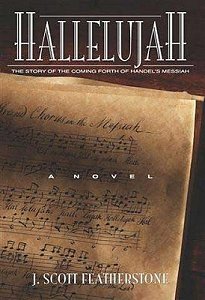| BOOKS |

|
| TITLE: |
HALLELUJAH:
THE STORY OF THE COMING FORTH OF
HANDEL'S MESSIAH
|
| AUTHOR: |
J.
SCOTT FEATHERSTONE
|
| PUBLISHER: |
ACW
PRESS
|
| ISBN
(HARDCOVER): |
1-892525-64-X
|
| ASIN (KINDLE): |
B00C2SSJRY
|
| UPC/EAN: |
978-1892525642
|
| LCCN: |
N/A
|
| YEAR: |
2001
|
| SERIES: |
N/A
|
| PAGES: |
576
|
| PUB.
LOCATION: |
PHOENIX,
ARIZONA
|
| DDC: |
813'.6
|
| EXCERPT: |
CLICK
HERE FOR SAMPLE PAGE
|
|
|
|
| DESCRIPTION:
Hallelujah is the remarkable story of one of
the greatest events in musical history, the
creation of George Frederic Handel’s
masterpiece, Messiah. Composed in just
twenty-four days, Handel’s “Grand Oratorio
which rendered him immortal” was birthed in
the darkest and most desperate hours of his
life. His health was failing. Critics
ridiculed him. Creditors hounded him. Enemies
persecuted him. Pride had nearly destroyed
him. Yet, out of Handel’s night emerged the
dawn of Messiah. Anyone who has thrilled at
hearing the Hallelujah Chorus will feel
“profound attachment” to Handel’s story of
hope and redemption as timeless and poignant
as the music itself. |
SITE RATING: 8/10
SITE
REVIEW: I was leery of tackling a
fictional account of the creation of
Handel's Messiah - there are so many
mawkish or contrived directions in which the
story could devolve that I honestly kept my
expectations low. But happily, this
lengthy, complex effort by J. Scott
Featherstone is full of gritty, honest
descriptions of both the times and Handel
himself. The author has some
small experience in writing for film and
television, but this is his only book, so
far as I've been able to discover; but he's
extremely talented at imagining a very real
sense of time and place, recreating both the
callous court politics of the day, as well
as the bleakness of life for the poor and
destitute. He describes the internal
machinations which pitted King George I
against his son, leading to a conspiracy
between George II and Handel's librettist
Paolo Antonio Rolli during the creation and
aftermath of their final opera, Deidamia and the resulting
decay of Handel's critical and popular
fortunes. Handel comes to full-blooded
life here - his over-sized Saxon temper, and
his self-effacing charm and wit on full
display - while a complex web of other
personalities are fleshed out around
him. The author also creates a new
creature: a street-urchin/thief nicknamed
"The Packrat" who finds himself swirling in
and around the events of the time, coming
into contact several times with the figure
of Handel, and allowing the reader to
experience the seamier side of life in
18th-century London through his eyes.
At a densely-written 576 pages, the author
takes his time filling in the spaces,
allowing the story of Handel's slow spiral
into public derision and destitution to
happen at a natural pace, and painting a
very colorful, and moving accounts of
Handel's devotion to his mother as well as
his extraordinarily generous giving to
charities . If I have any quibbles,
it's that the characters fall into familiar
patterns of "good guy" "bad guy" and "street
urchin with a heart of gold" which readers
of a more cynical disposition might find
hard to swallow; but there's enough grim
realism coating the prose that the book
never sinks into the trap of being a fluff
piece. In complexity and
characterizations it's reminiscent of
Dickens, with an ending that is very moving
- this novel is well worth tracking down and
reading from beginning to end. and the resulting
decay of Handel's critical and popular
fortunes. Handel comes to full-blooded
life here - his over-sized Saxon temper, and
his self-effacing charm and wit on full
display - while a complex web of other
personalities are fleshed out around
him. The author also creates a new
creature: a street-urchin/thief nicknamed
"The Packrat" who finds himself swirling in
and around the events of the time, coming
into contact several times with the figure
of Handel, and allowing the reader to
experience the seamier side of life in
18th-century London through his eyes.
At a densely-written 576 pages, the author
takes his time filling in the spaces,
allowing the story of Handel's slow spiral
into public derision and destitution to
happen at a natural pace, and painting a
very colorful, and moving accounts of
Handel's devotion to his mother as well as
his extraordinarily generous giving to
charities . If I have any quibbles,
it's that the characters fall into familiar
patterns of "good guy" "bad guy" and "street
urchin with a heart of gold" which readers
of a more cynical disposition might find
hard to swallow; but there's enough grim
realism coating the prose that the book
never sinks into the trap of being a fluff
piece. In complexity and
characterizations it's reminiscent of
Dickens, with an ending that is very moving
- this novel is well worth tracking down and
reading from beginning to end.
|
|

